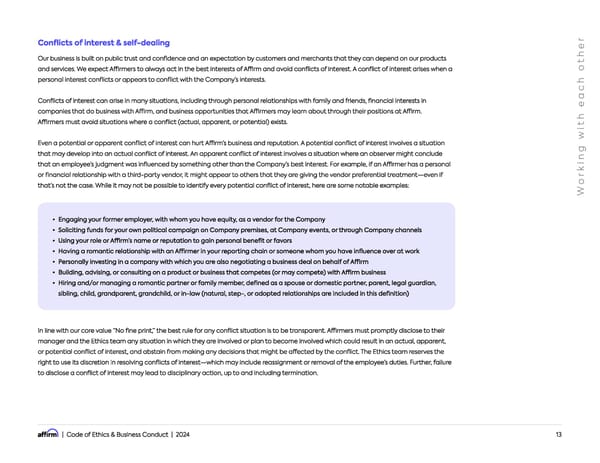| Code of Ethics & Business Conduct | 2024 13 Conflicts of interest & self-dealing Our business is built on public trust and confidence and an expectation by customers and merchants that they can depend on our products and services. We expect Affirmers to always act in the best interests of Affirm and avoid conflicts of interest. A conflict of interest arises when a personal interest conflicts or appears to conflict with the Companys interests. Conflicts of interest can arise in many situations, including through personal relationships with family and friends, financial interests in companies that do business with Affirm, and business opportunities that Affirmers may learn about through their positions at Affirm. Affirmers must avoid situations where a conflict (actual, apparent, or potential) exists. Even a potential or apparent conflict of interest can hurt Affirms business and reputation. A potential conflict of interest involves a situation that may develop into an actual conflict of interest. An apparent conflict of interest involves a situation where an observer might conclude that an employees judgment was influenced by something other than the Companys best interest. For example, if an Affirmer has a personal or financial relationship with a third-party vendor, it might appear to others that they are giving the vendor preferential treatmenteven if thats not the case. While it may not be possible to identify every potential conflict of interest, here are some notable examples: In line with our core value No fine print, the best rule for any conflict situation is to be transparent. Affirmers must promptly disclose to their manager and the Ethics team any situation in which they are involved or plan to become involved which could result in an actual, apparent, or potential conflict of interest, and abstain from making any decisions that might be affected by the conflict. The Ethics team reserves the right to use its discretion in resolving conflicts of interestwhich may include reassignment or removal of the employees duties. Further, failure to disclose a conflict of interest may lead to disciplinary action, up to and including termination. Engaging your former employer, with whom you have equity, as a vendor for the Compan Soliciting funds for your own political campaign on Company premises, at Company events, or through Company channel Using your role or Affirms name or reputation to gain personal benefit or favor Having a romantic relationship with an Affirmer in your reporting chain or someone whom you have influence over at wor Personally investing in a company with which you are also negotiating a business deal on behalf of Affirm Building, advising, or consulting on a product or business that competes (or may compete) with Affirm business Hiring and/or managing a romantic partner or family member, defined as a spouse or domestic partner, parent, legal guardian, sibling, child, grandparent, grandchild, or in-law (natural, step-, or adopted relationships are included in this definition) W o r k i n g w i t h e a c h o t h e r
 2024 Code of Ethics Page 13 Page 15
2024 Code of Ethics Page 13 Page 15